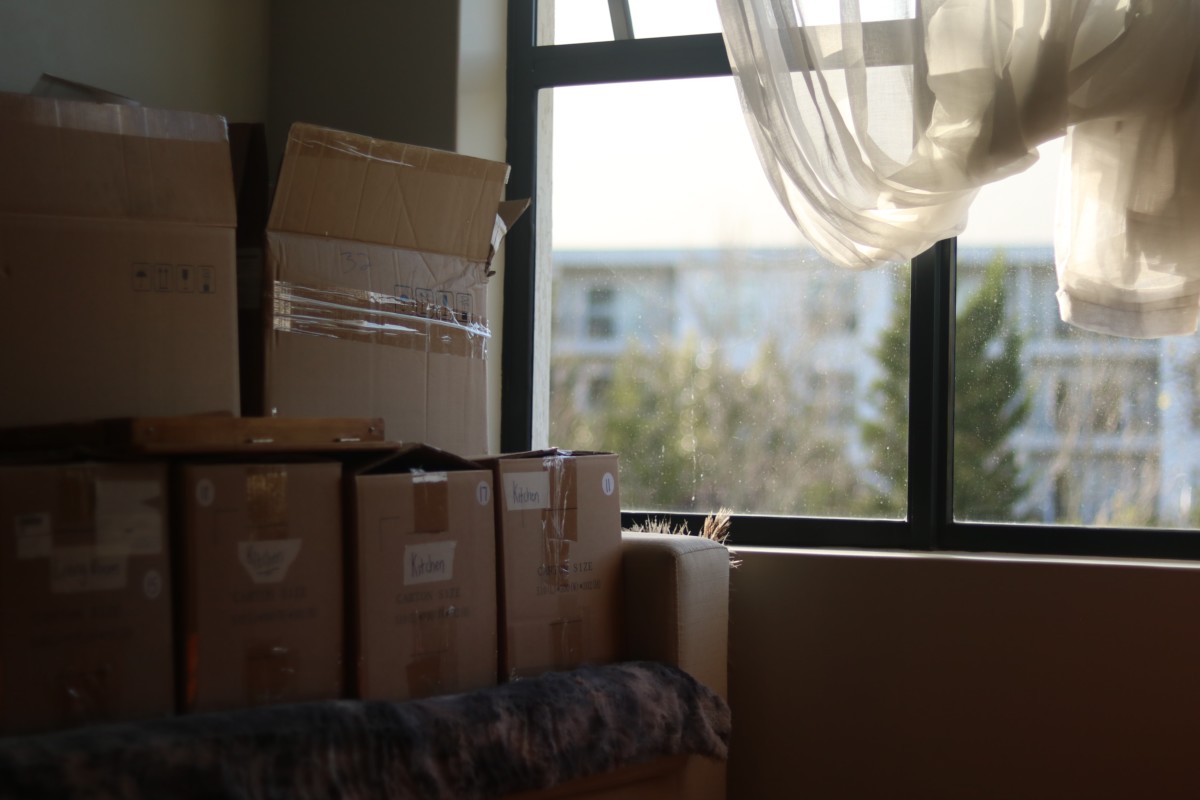There comes a time in every rental agreement when you want to move out. Whether you’re moving across the country, buying your first home, or simply looking for more space, you’ll still need to follow a few steps before your lease ends. And sending your written notice to vacate letter is one of those steps.
Outlined below are all the essential details you need to know about writing your notice to vacate letter, including why it’s important and what it needs to include. From protecting your security deposit to keeping a good relationship with your landlord, we’ve got tips and tricks to keep your move-out easy. Plus, we’ve provided a simple template to make things even easier for you to check this off your to-do list.

What is a notice to vacate letter?
A notice to vacate letter (aka lease termination letter) is a formal letter a tenant writes to their landlord or property manager to end their lease agreement. It’s an important legal document that protects the tenant and serves as proof they sent their notice within the required time frame. It also gives the landlord ample notice and enough time to find a new tenant or make other plans for their rental property.
The tenant should include their contact information, intent to end the lease, and the date they wish to vacate. In most cases, a landlord or property managers require a notice to vacate letter from their departing tenants. But even when not needed, it’s a good idea to send one anyways.
Is a notice to vacate letter the same as an eviction notice?
Confusingly, an eviction notice is sometimes called a “notice to vacate.” But generally, a notice to vacate letter is sent from a tenant to a landlord, whereas a landlord can send an eviction notice to a tenant if they violate the terms of the lease agreement.
A landlord can also send a “no-cause notice to vacate letter” to a tenant. This is not a credit-destroying eviction notice, though it can also be called a “no-cause eviction notice.” Instead, a no-cause notice is a notice of non-renewal. In other words, your landlord has decided not to offer you a new lease agreement. This is usually the case when a landlord plans to sell or renovate the property.
Do you need to give a 60 or 30-day notice to vacate?
In most cases, you need to provide some sort of notice that you intend to end your lease. Some landlords require you to provide written notice. Some are less formal and ask for an email or phone call. Whatever the case, always get a receipt or confirmation when your landlord gets the notice. Failure to provide proper notice can result in fines owed to your landlord.
The notice period you’re required to give depends on your municipal and state laws. In most cases, 30 days’ notice to vacate is required for long-term leases. But 60 days is also common, though less popular. Always double-check your lease agreement as well as state and local laws to ensure you know and follow the rules. Following what your landlord prefers usually makes things easier for you.
How much notice do you need to give for a short-term lease?
A short-term lease, sometimes called a tenancy-at-will agreement or a rental agreement follows similar rules. A rule of thumb here is that a tenant should provide notice at least one billable period before they wish to vacate. So in a month-to-month lease, you would need to provide one month’s or 30 days’ notice. In a week-to-week lease, a week or seven days notice is usually enough.

Notice to vacate letter template
You can use the template below as a guideline when writing your formal notice to vacate. Keep in mind that the “reason for leaving” section is optional. If your reason for leaving has nothing to do with your landlord, it’s nice for them to know. For example, if you currently live in an apartment in Seattle, WA, and are moving out-of-state, you can consider saying, “I’m not renewing my lease, because I’m moving to Boston, MA, for my new job.”
If there was an issue with the apartment, this isn’t the best place to bring it up for the first time. You can include information about an ongoing problem if you want to, but it’s not required.
Below is a sample letter template for a 30 or 60 notice to vacate:
[Your Name]
[Street Number, Apartment Number]
[City, State, Zip]
[Your Phone Number]
[Your Email Address]
[Today’s Date]
[Landlord or Property Manager Name]
[Landlord or Property Address]
[City, State, Zip]
Dear [Landlord or Property Manager’s Name],
In accordance with my lease, I am writing this letter to provide a [number of days] notice that I will move out of my apartment [rental property address and unit number] on [move-out date].
(Optional) I am not renewing my lease because [reason for leaving].
Please contact me via [preferred contact method] to schedule the final inspection. Please send my security deposit of $[amount] to my new address:
[New address or forwarding address]
If you believe the security deposit should be deducted for any reason in accordance with our lease agreement, please send me an itemized list of costs.
You’re welcome to [call or email] me with any questions.
Sincerely,
[Your name]
[Signature]
How to send your written notice to vacate letter
You can physically hand over your notice to vacate letter or mail it to their preferred address. If you want to be extra diligent when handing in your letter, you can ask your landlord to sign a receipt of notice. Or bring in two copies and have your landlord sign one for you.
If using the postal system, be sure to use certified mail. That way you’ll get a receipt of delivery, which will serve as proof that you followed your lease agreement should any issues arise. And it’s a great idea to follow up with your landlord a week or two after you send your lease termination letter, especially if you haven’t heard from them regarding the inspection.

6 tips to consider when writing your intent to vacate letter
1) Read your lease agreement again
There’s likely a paragraph or two about the proper way to notify your landlord about moving out. Sometimes an email is acceptable, or your landlord has a preferred template. You’ll also want to note your security deposit amount and any special terms in the agreement.
2) Include the date
Whether you use this template or a template provided by your landlord, the date is very important. That’s what proves you met the requirements for adequate notice — the 30 or 60 days required by your lease.
3) Be kind and straightforward
Consider your letter a professional courtesy and a future investment. If you continue to rent, you may need a landlord recommendation or two in the future. This is an opportunity to continue to stand out as an excellent renter.
4) Make your new address and contact information prominent
You want to make things as easy as possible for your landlord to return your security deposit. Be sure to make your new address legible and prominent for your landlord in your letter.
5) Make scheduling the walkthrough easy
If there’s an issue with the condition of your apartment, your landlord or property manager will point it out during the final move-out walkthrough. And you want to be present to make sure you know what your landlord is noting.
6) Know the rules for breaking your lease early
If you’re breaking your lease, you’ll likely have to pay an additional fee. Sometimes you have the right to terminate early, like for medical reasons or military deployment. Follow the rules, document everything, and work with your local tenant’s rights office for guidance.

What if I change my mind about moving?
If you change your mind, you can reach back out to your landlord or property manager to see if you can still renew your lease. Just know that you don’t have the right to renew your lease after you’ve sent your letter (unless local law allows it).
But that’s no reason not to ask your landlord or property manager if your current apartment is still available to rent again. Most of the time, it’s easier and cheaper to keep a renter in place rather than find a new one. And many landlords are happy to keep a renter they have a good relationship with.
What are the next steps after sending the notice to your landlord?
After sending a proper notice to vacate to your landlord and establishing your move-out date, there are a few additional things you can expect.
Unit may be shown to prospective tenants
Your landlord may ask for the right to show your apartment where a prospective tenant does a walkthrough. Your landlord is supposed to arrange showing times in advance, usually at least 24 hours. In some cases, you have the right to refuse a showing. But it’s a good idea to work with your landlord to create a showing schedule. For example, you can give them the most manageable days and times for you. This will maintain a good landlord-tenant relationship.
Schedule your move-out inspection
Your inspection should take place after you’ve moved out all or most of your stuff. If you have cleaning responsibilities, it’s best to have the walkthrough after you’ve cleaned. During the inspection, your landlord will check the apartment’s condition and point out anything they think is outside normal wear and tear. This is also an opportunity to discuss any repairs beforehand and gives you a chance to address them. Always ask for an itemized list of repairs to prevent any disputes with the security deposit.
Move into your next place
Now it’s time to unpack those boxes. You’ll also want to update your mailing address with your bank, student loan company, and other important entities. It’s also a great idea to set up a mail forwarding address, which you can do easily online through the USPS website. And don’t forget to update your voter registration.
Receive your security deposit back
So long as you leave your apartment in good condition, your landlord must return the security deposit within a specified time period according to the rules in your state. Generally, it’s between 15 and 60 days, but it’s a good idea to review local laws. Be sure your landlord knows where to send it and how to get in touch with you if they have any questions.



























 United States
United States Canada
Canada